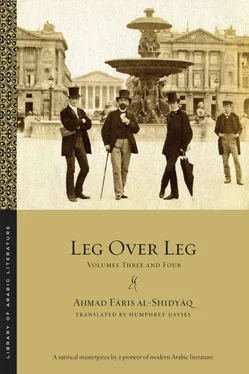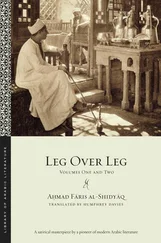3.2.15
Love has likewise three states with respect to means or the lack thereof — by which I have in mind material comfort, hardship, and their midpoint. The affection of the man of comfortable means is the coolest and most fickle, for his wealth allows him to change beloveds and shift from state to state. Let respectable women beware this type of man lest he spread scandal among them, unless they have no fear for their secrets and their honor, for the rich man has as little against giving away secrets as he has against piling up money, and to him everything is to his coin subservient , to his greed obedient . The affection of the poor man, in contrast, is the most excessive, deviant, and agonized, for his poverty, being an obstacle to his removal of the impediments that stand between him and his beloved, leads him in no time to despair, insanity, or suicide. The love of the man of middling means is the most balanced and healthy.
3.2.16
There are three more states of love, namely abjection, pride, and equality. Abjection usually is the state of the suitor, pride that of the one to whom suit is made. One of the most amazing kinds of affection is love mixed with hatred. An example would be a man who loves a woman who loves another man, and therefore refuses his advances. His fervor then urges him to pursue union with her as a form of vengeance against her. If he is successful in this, his love overcomes his hatred for her; if he isn’t, it doesn’t, and he remains in this state until some consolation distracts him from her. Generally speaking, the lover doesn’t forget his beloved when the latter treats him with aversion and denial but only on winning another who resembles the first physically and temperamentally (though how rarely that happens!).
3.2.17
As to the incitements to love, these include a single sighting that touches a sensitive chord in the seer’s heart, after which he is pervaded by the same feelings conducive to ardor and longing that long association would create. In such cases, in my opinion, the lover must previously have pictured in his mind certain characteristics and specifics of comeliness and fallen in love with these; then, when he sees them as he had pictured them, realized in a particular body, his heart and mind cleave to it and he is like one who finds something he had lost and was looking for. Love may also come about as a result of hearing about someone for such a long time that, little by little, the hearer becomes so familiar with that person that he becomes devoted to them. The commonest causes of love, however, are looking and association.
3.2.18
Know too that many people have fallen in love with beautiful pictures, of males or females, and not for any lewd or immoral reason but simply because by so doing they found their souls were set at rest and their minds afire, being strengthened in this by the tradition that runs “He who loves, keeps silent, is chaste, and dies, dies a martyr.” In such a situation, the suitor is pleased with the slightest thing his beloved may give him: a kiss, to his mind, is a victory, a triumph, a prize of war. As al-Sharīf al-Raḍī says:
Ask my bed of me and of her, for we
Are content with what our beds may tell of us.
(If I were given a free hand with this verse, I’d change it to “of her and of me.”) 22And Ibn al-Fāriḍ, may God have mercy on his soul, says:
How oft he spent the night at the mercy of my hand, when we were joined in love!
Within his doubled mantle godliness resides — we are innocent of all pollution.
This kind of passion is called “platonic love” by the Franks, in reference to Plato the philosopher; it does not exist among them in reality, being merely a term they use. Among us it is known as “ʿUdhrī love,” after ʿUdhrah, a tribe in Yemen, and not after the ʿadhrah of the slave girl, meaning her virginity and intact state as well as something else that comes from her. 23It is related of Majnūn Laylā that Laylā came to him one day and started talking to him, but he said, “Away with you! I am too busy with my love for you.” And al-Mutanabbī says in the same vein,
I was distracted from returning your greeting
And the source of my distraction was yourself.
3.2.19
The woman most worthy of love and esteem is she who adds culture and beauty of expression and voice to beauty of appearance, and the most fortunate of persons is “a lover who’s got a lover who loves him,” as it says in an Egyptian mawāliyā . In such a state, he will be emboldened to undertake the toughest of tasks and mightiest of endeavors and, his thoughts being ever preoccupied with his beloved’s charms, will perform them as though they were nothing. In such a state, were he to shoulder a rock, or even a mighty mountain, he’d fondly suppose he was lifting his beloved’s slippers or, to be more precise, his legs. Moreover, despite all the moments of misery, disappointment, deprivation, and, above all, the torments of jealousy that accompany love, there is nothing good about the life of the fancy-free. Love stimulates manliness, pride, gallantry, and generosity. It inspires the one in love with refined ideas and nice notions. It imbues him with godly morals and makes him want to do something great for which his name will be remembered and that will bring him praise, especially from his beloved. Rarely have I met a person in love who was cold and crude , foolish and given to hebetude , or base and rude .
3.2.20
A certain abstemious person (who must, I think, have been a premature ejaculator) once said, “If the only thing — all considerations of continence and godliness aside — to prevent one from falling in love with a woman were the necessity of doing so, it would be enough, for when a person knows he is compelled and obligated to love something, he naturally finds it irksome and eschews it. It follows,” he went on, “that love of a woman is contrary to nature, though this is only if the man is perspicacious, self-respecting, and high-minded. The rabble, by contrast, have no self-respect and fall in love with women haphazardly, at the drop of a skullcap.” I say, “These are the words of one who has never tasted love, or was loathed by his wife. Had he ever heard a woman say to him, ‘Bear, my darling, this load of firewood on your head’ or ‘Bump along, my sweetheart, on your backside like a little boy,’ he’d obey her in both bearing and bumping.(1)”
3.2.21
It is also the case that lovers follow different schools in love. Some love a woman who is all artifice, affectation, and vanity, while others do not find these things pleasing, preferring natural beauty and that their beloved should have a degree of naïveté and simplemindedness. This is what al-Mutanabbī was alluding to when he said:
In the city, beauty’s an import, freshened up for the market.
In the desert there’s a beauty that needs no importing.
An example of the first kind is the man who is offered a certain dish when he has no appetite, so it has to be spiced up and faked. An example of the second is the man who suffers from diochism 24or metafaucalophagy,(2) so that the absence of spicing and herbs cannot stop him from guzzling, tidbitting, and lapping until he’s licked the bottom of the bowl clean after first polishing off its contents. As far as the desire of certain people for naïveté and simplemindedness is concerned, it is based on the fact that the lover is always demanding things that he needs from his beloved and if the latter is possessed of cunning and intelligence, he will fear she may find this irksome and refuse him.
3.2.22
Читать дальше












